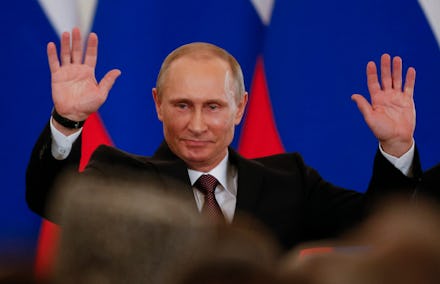Putin Sums Up What's Wrong With U.S. Foreign Policy in One Sentence

Vladimir Putin's 40-minute speech following his swift annexation of Crimea was everything you'd expect it to be. The ruler's address was emotional, patriotic and, most importantly, very self-aware. The world is watching the leader's every move as East vs. West Cold War whispers fill government halls around the world, and Putin knows it.
In an ironic twist, Putin turned western accusations about disregarding international law upside-down, and unfortunately he might be right about this one.
Russia's move to annex Crimea drew condemnations from the West, including U.S. vice president Joe Biden, who called the treaty a "blatant violation of international law."
"They tell us that we are violating the norms of international law. First of all, it's good that they at least remember that international law exists," Putin said in response to the criticism.
Unafraid of the sanctions beginning to pile up against Moscow, or the world leaders decrying what has been called an invasion of Ukraine, Putin turned the criticism away from himself and back to the West in his speech.
Cue the awkward pause. The leader known for "soft authoritarianism," stamping out LGBT rights and rising military machismo may actually have made a valid point regarding western, and specifically U.S., foreign policy.
Of course, this is a classic case of "whataboutery," in which Putin is attempting to distract from his official takeover of Crimea by pointing his fingers at the United States. Both countries should be held accountable for violating international law. But what's unsettling is that what he points out isn't necessarily incorrect.
Two issues in American foreign policy that have received criticism from law professors and UN officials immediately come to mind. The extrajudicial killing of American citizens living abroad, even if suspected of terrorist activities, has come under fire by advocates pointing to constitutional law. As explained by the Atlantic, the Fifth Amendment states, "No person shall be held to answer for a capital, or otherwise infamous crime, unless on a presentment or indictment of a Grand Jury." It also forbids the taking of a person's life or liberty "without due process of law."
Many also denounce the United States' drone attacks in the Middle East, citing that they violate national sovereignty of countries like Pakistan. While Russia is being pinned down for violating the national sovereignty of Ukraine, is the United States free of such accusations?
Whether for political gain or not, Putin's pointed comments have, dare we say, some merit. While the legality of U.S. foreign policy can be (and probably will be) debated for years to come, one thing is certain: Putin made sure to make his post-Crimea annexation speech a spectacle.